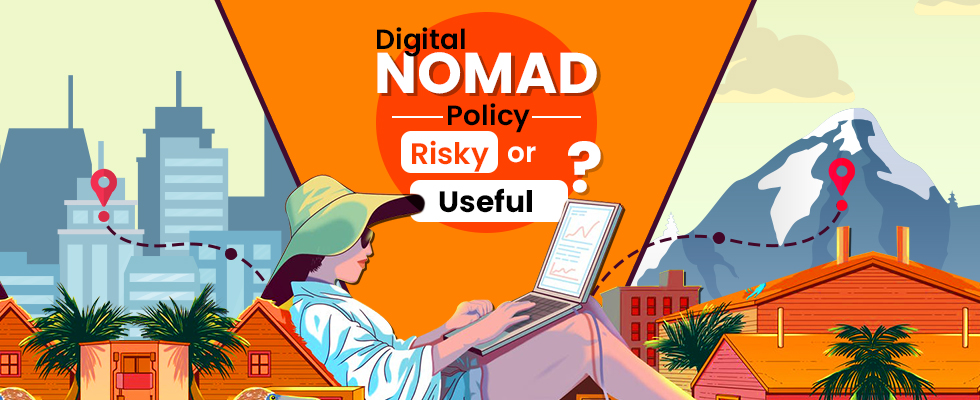The Digital Nomad policy is rising day by day, and it has attracted media attention over the recent years. Digital nomadism has got boom after the COVID-19 pandemic, and regular workers wish to work from home. Social media has shown pictures, videos, and selfies of people with a laptop device in one hand and a pina colada in the other. People caption Office for the day. Few have posted pictures with the dogs at the beach. So many workers worldwide want to be digital nomads.
We are at the brink of remote workers disintegrated worldwide & we are about to see a digital nomad movement no time ever before in our lives.
The Post pandemic world has made an increasing number of people be digital nomads –not only the young workforce these days is posing aside palm trees. The world has never seen workers traveling from one city to another and from one country to another. Companies worldwide are thinking about nomad policy for their workers. However, reservations are there that (Digital Nomad) it would be risky or progressive for their business.
What Is Digital Nomadism?
There is a fine line between remote workers and digital nomads. Nomad workers are independent that loves to choose the location of their choice. They change their locations from time to time work online. They are technology-centric workers who use laptops and the internet. According to the research, more than 4.8 million workers introduce themselves as digital nomads, and almost 17 million people want to be nomadic.
How Are Digital Nomads Policy Rising?
There are plenty of factors contributing to remote and independent workers that want to adopt digital nomadism.
They are in a diverse group and belong to socio-economic classes. They are one-third of females and 54% over the age of 38. They are creative, talented, creative professionals who belong to the IT and marketing profession.
They earn a handsome amount of money and do full-time and part-time jobs. The internet boom and digital devices have developed them towards nomadism. The revolution in technology has grown them to become remote workers.
What Does MBO Partners & Emergent Research ‘Digital Nomad Study say?
Over a few years, MBO Partners and Emergent Research came up with a study about digital nomadism. The study says hundreds of thousands of Americans, introducing themselves as digital nomads. More than 7.3 million Americans are nomadic, and 10.9 million have recently become remote workers or digital nomads. The independent workers are rising day by day like freelancers, contractors, digital marketers, and self-employed. Many digital nomads have traditional jobs rises to from 3.2 million to 6.3 million in the year 2021. Traditional employees are turning to non-traditional ones.
Digital nomads are highly skilled and tech-savvy. Remote workers are dependent on digital devices and cyberspace. Many workers are in high-demand and tech-centric. They are more likely to be programmers, IT professionals, writers, and digital marketing professionals.
According to the reports, digital nomads provide a high level of work satisfaction to their employers. The fascinating thing about nomadic workers is that they could be employees and employers as well.
Is Digital Nomad Workforce Productive or Destructive For Businesses?
Many organizations worldwide have brought new policies for their employees during and after the pandemic. Companies across the globe have introduced work from the home policy. Most companies don’t allow their employees to change their location whenever they need, because there are plenty of factors that insecure business firms about their productivity and business safety. Therefore, we discuss the advantages and disadvantages of digital Nomads for business firms.
How Digital Nomads Are Useful Then Regular Workers?
The digital nomadic workforce has many benefits for both employers and their employees. Seemingly, there is a win-win situation for both business professionals and workers. Let’s discuss how digital nomads work better compare to remote workers and regular workers.
Decreases Overhead Cost
Most companies that have introduced a policy for their digital nomads get benefits like low overhead costs. Employers do not need to maintain offices, rent, space, and more. They can save their utility bills, lunch, medicals, and others alike. They don’t need transportation because their workers are working remotely. Digital nomad employees and employers don’t need to be location-centric, and everyone does work following their working hours.
Boost Productivity
It is a misconception that only regular employees can boost the productivity of the business. Remote workers bring more productivity and meet deadlines compare to the office-based workforce. Almost two-thirds of employers have got more productivity from telecommuters.
Extra Time to Work
Remote workers generally spend more time working than other employees. They take fewer breaks, often opt to work even when sick, and have lower turnover rates.
Remote workers are likely to spend more time compare to regular employees. They take short breaks, and also do work when they are sick, and have low rates as compare to the regulars.
Instant Communication
Regular employees have to listen to the instructions of their bosses in offices, but remote nomads don’t need to do that. They use instant communication channels like Skype, WhatsApp, and emails. They use video conference call to interact with the employers or the working staff and the team members.
Under which Circumstances Digital Nomads Risky for Business
Here are the risks for nomad employees and employers while offering and accepting work remotely. Let’s discuss briefly.
Travel without Organizational Knowledge
Remote workers or nomads travel without their employer’s knowledge. Interestingly, full-stack digital nomads can travel, but temporary ones don’t travel without their employer’s permission. Employers often got reservations due to locations. Most companies don’t allow employees to move out without their knowledge because of business secrecy. A nomadic employee can unveil the business secrets to third parties for making easy money.
Difficult to Measure Nomads Working Hours
Nomad employers and employees often go issues with each other if the employer is paying for per hour. It is difficult for the employer how many hours employees have spent on their assigned tasks. On the other hand, employees are unable to prove the exact time spent. It could lead to escalation because employers did not agree about how much time someone has spent on a task.
Variety Regulatory & Illegal Risks
Sometimes both employers and employees face tax, regulatory, and many other law-related issues. Employers are unable to prove that they are running a business at someplace. Employers accidentally end up breaking the law and rules. Employees ask for the salary feasible in New York City, and employers say come to that City and get paid.
Lack of Check & Balance
Employers enable to know what nomadic employees are up to during working hours. How remote employees working? What safety measures do they have to protect the intellectual property of the business?
What Should Be The Technology For The Age of Digital Nomadism?
Today we are living in the world where you will hear number of words for remote workers that are following:
- Telecommute or Telework
- Remote worker
- Work from home
- Virtual worker
- Digital Nomad
All of these are almost the same, only nomad employees a little different. They are very technical and are savvy people. Now the question arises what technology digital nomad employees and employers should use for the age of nomadism.
We live in the digital age where business professionals and workers are savvy and use computers, PCs, laptops, the internet, and mobile phones. The management side of nomads could face plenty of issues while dealing with fellow nomadic workers. They have to manage nomads rather than having in-person meetings, and they can do that face-to-face meeting using technology.
Top Tech-Tools to Manage Digital Nomads Remotely:
Here are the few technologies that enable managers and employers to keep a check on nomadic workers without asking them a question.
Location Tracker
Are you wanted to track the location of your digital nomad worker? You can use a phone location tracker to monitor and track your employees that change their location. You can get live location, location history, and mark safe and risky zones.
Screen Recording
Nomadic employers can easily record live PC and mobile screens of their digital nomad workers to keep an eye on tasks on their computer devices, phones, PCs. They can remotely record short PC and computer screen videos and get them into their secure web control panel.
Call Recording
Managers can record live phone calls and voice messages of the digital nomadic employees and send their reports to the nomadic employers.
Screenshots
Employers who are digital nomads also capture screenshots of compute and mobile devices provided to digitally nomad managers. Employers can keep an eye on business devices because they are paying them for their job.
Keystrokes Logging or Keylogging
Employers can capture and record keystrokes and keylogging of the employees and managers working remotely and chatting on their business devices. Digital nomad employees can make checks and balances on their workers’ and managers’ emails, chats, and social discussions.
Conclusion
The modern age has come up with the technology boom, and the pandemic made people work from home. The digital nomad is rising day by day, and we have to adopt technological tools like employee monitoring software for android, iPhone, PCs and computers to keep track of digital nomads.







